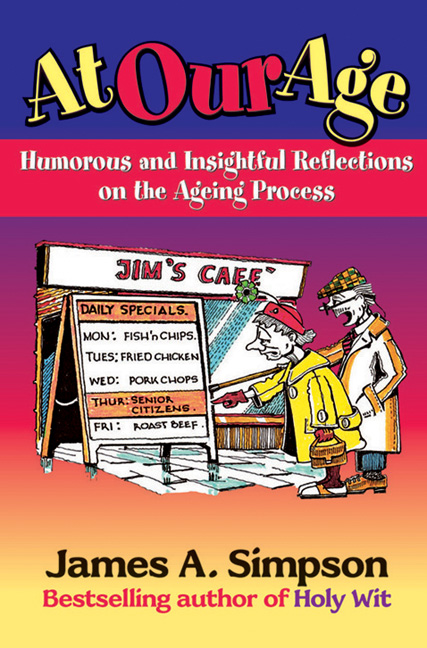
 | At Our Age James A Simpson |
| sample extracts... | |
What changes there have been in the life-style of the elderly during the past hundred years. At the beginning of the 20th century the majority of women over 70 were bespectacled, sock-knitting and white-haired. Many of them seemed resigned to a slow slippered twilight. They wore dark clothing which sometimes had a mothball smell, and seldom ventured far from home. Today they have life-styles their parents would have found unimaginable. Living independent lives, they wear far brighter and more fashionable clothes. They surf the net and regularly travel abroad. When one such eighty-year-old woman was congratulated on being so spry for a woman of her age, she retorted sharply, 'I will have you know that I am not a woman of my age!' When John's grandfather asked him what position he played in the school football team, John said he was not sure, but he thought he had heard his teacher refer to him as the team's main drawback. A nine-year-old grandson had difficulty believing that his grandfather could possibly have enjoyed life back in the Dark Ages when there were no mobile phones or iPods or colour television. 'You know, Grandpa, now when I think of you as a little boy I will always think of you in black and white.' With the passing years I have become more and more aware of my indebtedness, to great composers and artists, to novelists and film makers, to saints and heroes, to inventors and medical pioneers. The civic motto of Belfast is 'Pro tanto quid retribuamus'. In spite of the local translation 'How much can you get for a quid?' it really means, 'In return for so much what shall we give?' Behind the motto is the thought that the person who is aware of his indebtedness will be more likely to feel constrained to be a better citizen. 'We ought because we owe.' I smiled recently when I saw on the back window of a van, a new version of the song of the seven dwarfs -- 'I owe, I owe, so off to work I go.' In so many spheres of life our acknowledgement of debt strengthens our sense of obligation and determination to work harder. In his biography of St Francis of Assisi, G. K. Chesterton wrote, 'It is the highest and holiest of paradoxes that the person who really knows he cannot pay his debt will be forever paying it.' On returning from a holiday in Germany an elderly couple told their friends how one day they got lost in Cologne. They had carefully noted that they had parked their car on a street named Einbahnstrasse, but when they came to look for it, every street seemed to have the same name. They finally stopped a policeman to ask for help. That is when they learned that Einbahnstrasse means 'One-way street' As an old lady stood on the kerb vainly trying to cross a busy city street, a policeman approached her. 'Excuse me, Madam, there is a pedestrian crossing further up the road.' 'Then', retorted the old lady, 'he is having better luck than I am. I have been trying to cross here for the last fifteen minutes.' An elderly man went to his doctor complaining about a pain in his neck. 'Every time I press my neck, doctor, I get this shooting pain.' The doctor discovered he had two broken fingers. When in the 1960s the film Battle of Britain first came out a retired Flight Commander was asked if he was going to see it. 'No I don't think I will bother. I saw the stage show.' One day an elderly gentleman met in the street, a man he had not seen for some time. When he was younger he had known the man and his brother well. Puzzled as to which of the two brothers it was, he said, 'Was it you or your brother who died?' |
|